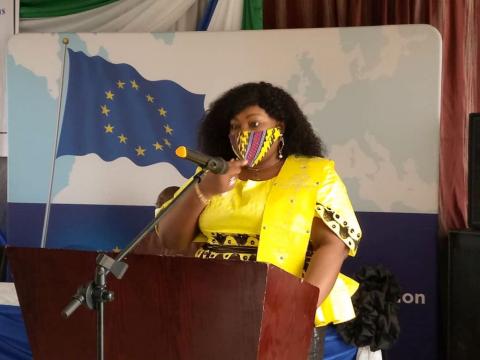By Mabinty M.Kamara
Statistics Sierra Leone (Stats SL) and the elections monitoring group, National Elections Watch (NEW) are at loggerheads over the planned conduct of the Mid-term Population and Housing Census.
The census which was initially scheduled for this December was last week rescheduled to April 2021.
Since the presidential proclamation on the exercise earlier this year, NEW has contested the rationale behind it, citing the intent and inclusiveness of the process. This stance was reiterated in the civil society organization’s latest press statement on the rescheduled date, which has attracted a reaction from the Statistician General.
One of the reasons forwarded by NEW in its initial call for postponement of the exercise was the effect of the ongoing Covid-19 pandemic, and back then Stats SL wouldn’t budge. And now Covid-19 is the main reason forwarded by the statistical agency for rescheduling the exercise.
NEW, in its latest statement dated October 26, said this reasons advanced by Stats SL were not convincing enough, noting that the planned census was declared at the height of the pandemic.
“Though NEW recognizes that COVID-19 is still in existence, NEW is however not sufficiently convinced with this reason advanced, owing to the fact that the proclamation for the conduct of a Mid-term census was done at the height of the pandemic in the country. While in the same vein, NEW also premised its position on prioritizing the fight against COVID-19 pandemic as against conducting a Mid-term census at that critical time in our country,” it says.
And while in its initial objection it called for the temporary halting of the planned exercise, now the pressure group is calling for total cancellation of the exercise at least until 2023. It stressed that deferment of the census to April 2021 has a potential effect on the general elections calendar of 2023, noting that it might affect the timely production of the voter register.
In response to the numerous concerns raised by the NEW, Statistician General Prof. Osman Sankoh in a press statement reiterated that the idea of the mid-term census emanated from them as an agency, and that it was informed by the fact that they couldn’t provide data for certain localities, as a result of the anomalies charactering the last census.
“We wanted to share data from the 2015 census widely but couldn’t because of my/our inability to specify 59% of population data on localities, scattered across the country,” Prof. Sankoh wrote.
He added: “Analysis was possible only at the level of Enumeration Areas, one-level above. That was good if you didn’t want to know about the population of individual settlements. So with my team we convinced the World Bank to contribute to fund the project. We started with $2m, it went to $4m and eventually to $6m,” the statement reads.
Sankoh noted that the engagement started in early 2018, which was before the outbreak of COVID-19.
The Statistician General also provided answers to concerns raised by NEW regarding transparency and accountability of the process, including monies received from donors.
Sanko assured the public of a credible and transparent process, noting that it started engagement with NEW to support the process and has also invited them to the Technical Committee Meeting.
Copyright © 2020 Politico Online









